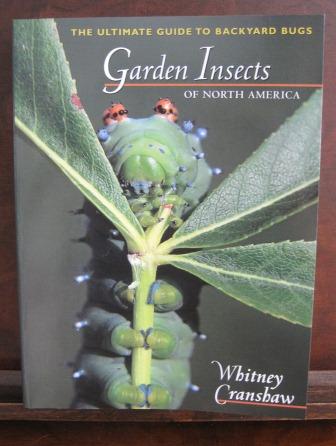I’m not much of an entomologist. (Okay, I’ve never had a single bug-related class.) But I do appreciate insects in all of their bewildering shapes and behaviors. And after this weekend I’ve become a little more entomologically educated.
I spent the weekend in Prescott, Arizona at the annual MG conference. Besides meeting lots of great Master Gardeners (and Extension educators) in that state, I also met Dr. Whitney Cranshaw from Colorado State University. He gave a keynote talk called “Gardening for Insects – or not!” This was a seminar that presented positive and negative aspects of gardening for butterflies, honeybees, and other favorite insects.
Here are just a few of the nifty things Whitney had us consider:
- Not all butterflies are nectar feeders; some prefer rotting fruit or dung. Hmmm. I might have to limit my varieties.
- The caterpillars of some striking butterflies might need you to share some garden greens. Larvae of black swallowtail butterflies eat parsley, fennel, and dill, for example. Accepting damage on these plants will ensure a healthy population of adults for your viewing pleasure.
- It’s best to accept some degree of pest insect presence, like aphids, to provide food for beneficial insects. Insecticides are not part of a successful garden for insects.
- The first bumblebees of the season are always small; they’re produced by overwintering queens whose resources are limited. These new workers help gather more food, so that those produced later are larger.
Whitney has a fantastic collection of photos of insects, up close and personal. Some of these are also in his book Garden Insects of North America (Princeton Press). It’s over 600 pages of full-color photos and engaging text. Instead of being organized by family, it’s organized by feeding habit, so you can quickly look up and identify whatever weird bug you’ve found snacking on your snapdragons. There are sections on how to manage pest insects, and a chapter dedicated to beneficial bugs.

Amazingly, this book is only $29.95. I bought one.
Finally, I have to recognize Dr. Cranshaw as one of an unusual breed of faculty. He is passionate about educating adult audiences like Master Gardeners, and indeed his book is dedicated to entomology educators and the nationwide Extension system. What a great resource for gardeners everywhere!
Yes, yes, kudos to Dr. Cranshaw whom I depended upon as an extension hort/Master Gardener educator! Great book and other helpful articles and research!
I would love to hear him talk. That’s one of my fave insect books, along with the one from Cornell. They’ve identified many insects for me.
My Christmas list is getting longer and longer … most of it ga
rden books.
Here’s another resource for MG’s on Entomology, similar to what you get for Horticulture from the GP’s. Dr. Michael Raupp, PhD, an Extension Professor with the University of Maryland, maintains a site called “Bug of the Week” with a weekly column that includes pictures and video.
http://www.bugoftheweek.com/
I bought this book a couple of years ago & I use it constantly to determine what insect is causing plant damage.